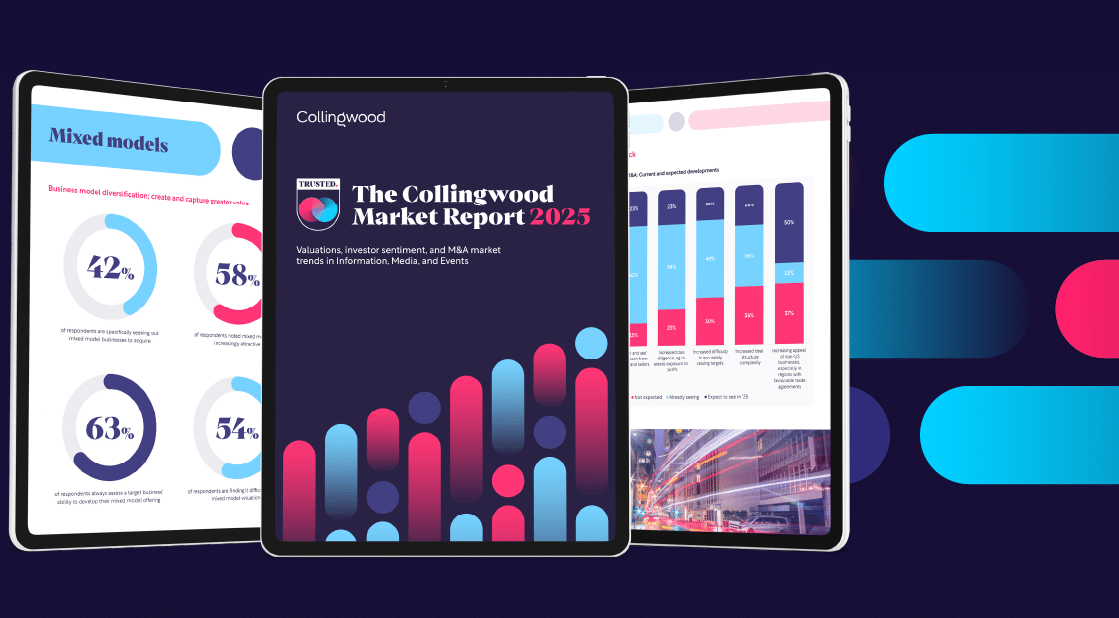As a founder or CEO of a B2B media, information or events business, the decision to sell can often seem like the only path if you’re thinking about taking money out, retirement, funding growth and other challenges – and especially so when competitors and other companies like yours are doing just that (we all take note of our competitors or peers who have recently sold, or about the latest data business that has achieved an eye-watering multiple).
However, as the landscape of capital structures evolves, B2B media, information and events entrepreneurs should recognise that selling outright may not always be the only solution. Before embarking on the journey of selling your business, it’s crucial to pause and ask yourself: What problem am I trying to solve? At Collingwood, we help entrepreneurs and management teams grow their businesses, drive value, sell or seek investment. But an exit can mean very different things for different people.
Capital structure alternatives needn’t be daunting
While the allure of a straightforward sale to a trade buyer or private equity firm may seem enticing (and it’s a path that we know well), it’s essential to realise that this is not the only way forward when you are thinking of ownership, management and growth. There may be alternative capital solutions out there, each with its own set of nuances and benefits.
Capital structure alternatives may sound daunting at first, but a skilled adviser can help navigate the complexities, ensuring that you explore all viable options before deciding.
Consider the following scenarios:
- Founder’s Exit Strategy: Are you looking to retire and exit your business, passing the torch to new leadership? Or are there no succession plans?
- Management Buyout: As a CEO, are you interested in buying out existing owners to take greater control of the business whilst providing liquidity for the current owners?
- Acquisition Ambitions: Is growth through acquisitions part of your strategic vision and do you want to know how to fund them?
- Strategic Growth: Are you aiming to accelerate your business’s growth and require additional capital to fund the team and working capital?
- Shareholder Problems: Do you have shareholders that want to sell? Or a shareholder base that you want to streamline, allowing some to exit while retaining others?
- Business Focus: Do you have multiple businesses and want to exit one to concentrate on another?
In each of these scenarios, traditional options such as private equity and trade buyers are the first place that many entrepreneurs turn, and the structures and processes to achieve them are well known.
However, by broadening your perspective, you may uncover there are other ways to achieve what you want. An adviser may be able to recommend other innovative structures that better align with your objectives. For example:
- Alternative debt providers. Rather than the traditional banks there are funds and specialist lenders that can provide you with debt finance. This might be a better alternative to seeking an equity provider who will then require a say in your business. It may also be an alternative that provides a stepping stone for you to grow to a scale where Private Equity and other sources of finance become more readily available
- Non-traditional equity providers. Some alternative types of private equity look at funding businesses with preferred instruments and debt combinations. This can leave management or founders in a more significant position of power, owning more of the business than if a more traditional private equity investor came in. They tend to look for lower returns and structure them by offering a mixture of debt and equity
- Family Offices. Family offices and family office groupings are increasingly interested in funding businesses directly. They are often run in a similar professional way to many private equity firms, but as they are backed by ‘family’ money they can be more flexible in their approach to investing. This means they:
- Can invest for longer (no ‘fund life’ that forces a sale)
- Are not limited to a specific investment in a single business (they can invest as much as they want and potentially support more acquisitions or growth)
- May bring sector expertise through the family (or families) that are behind the Family Office.
- Employee Ownership Trusts (EOTs). EOTs are increasingly being seen as a way founders can ‘pass the baton’ to employees. The UK government introduced EOTs in 2014 as a way for employees to buy their businesses. They essentially work through the founder / owners selling their shares into a trust and using the cash in the business, debt and / or future income to pay for the shares. The benefit for the seller is that there is no capital gains tax on the exit. However, the rules and risks of EOTs are complicated and will need careful advice.
Unlocking the full potential of your business
As a business owner or management team, you’ll likely receive regular approaches from buyers. At Collingwood we are well prepared to advise you on these approaches – selling businesses and working with private equity funds is where we have deep sector knowledge and experience. But we also want to understand you better and what you want from a capital event or sale, meaning we can tailor the approach to address your specific needs – whether it’s maximising value, preserving a legacy, or ensuring a smooth transition for employees.
This understanding then enables you to achieve the optimal outcome for you and your business. Sometimes the goal is not merely to sell a business, but to solve the underlying problem effectively. The right adviser can help you look at how the right capital structure alternative can unlock your business’s full potential.
So, before you rush into a sale, speak to an adviser to consider all the possibilities: seek out expert advice, explore the options available, and make a decision that aligns with your long-term vision. The best solution may not always be the most obvious one.
Whether you’re striving for an exit or capital event, Collingwood has the right expertise to help you find the right buyer or investor – for you and your business. Speak to one of our team to find out more.
Adam Shaw is the Global Managing Director of Corporate Finance at Collingwood. He has over 25 years’ experience in investment banking and private equity. He has both sold and acquired businesses ranging from £10m-£500m in value as private and public transactions.



